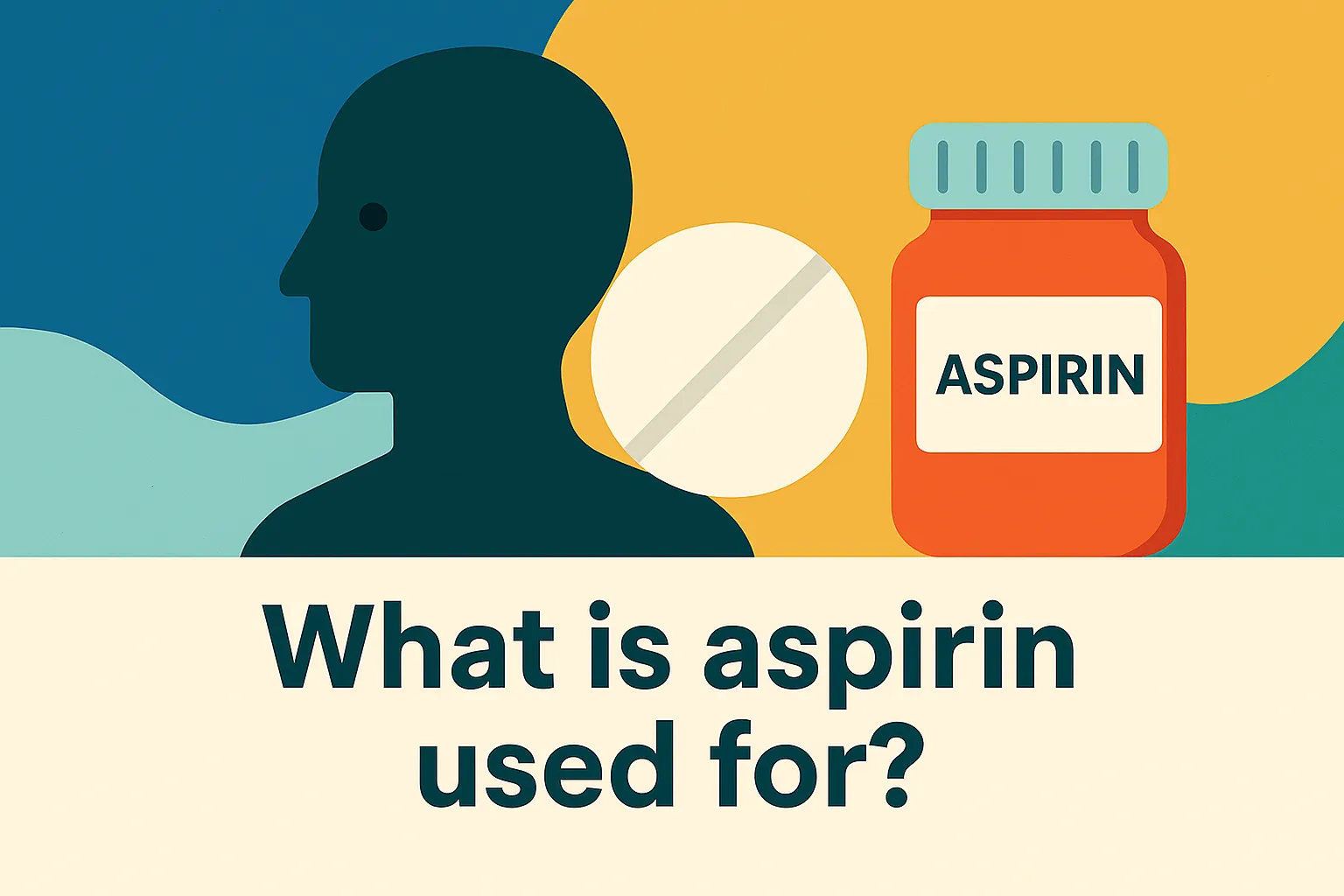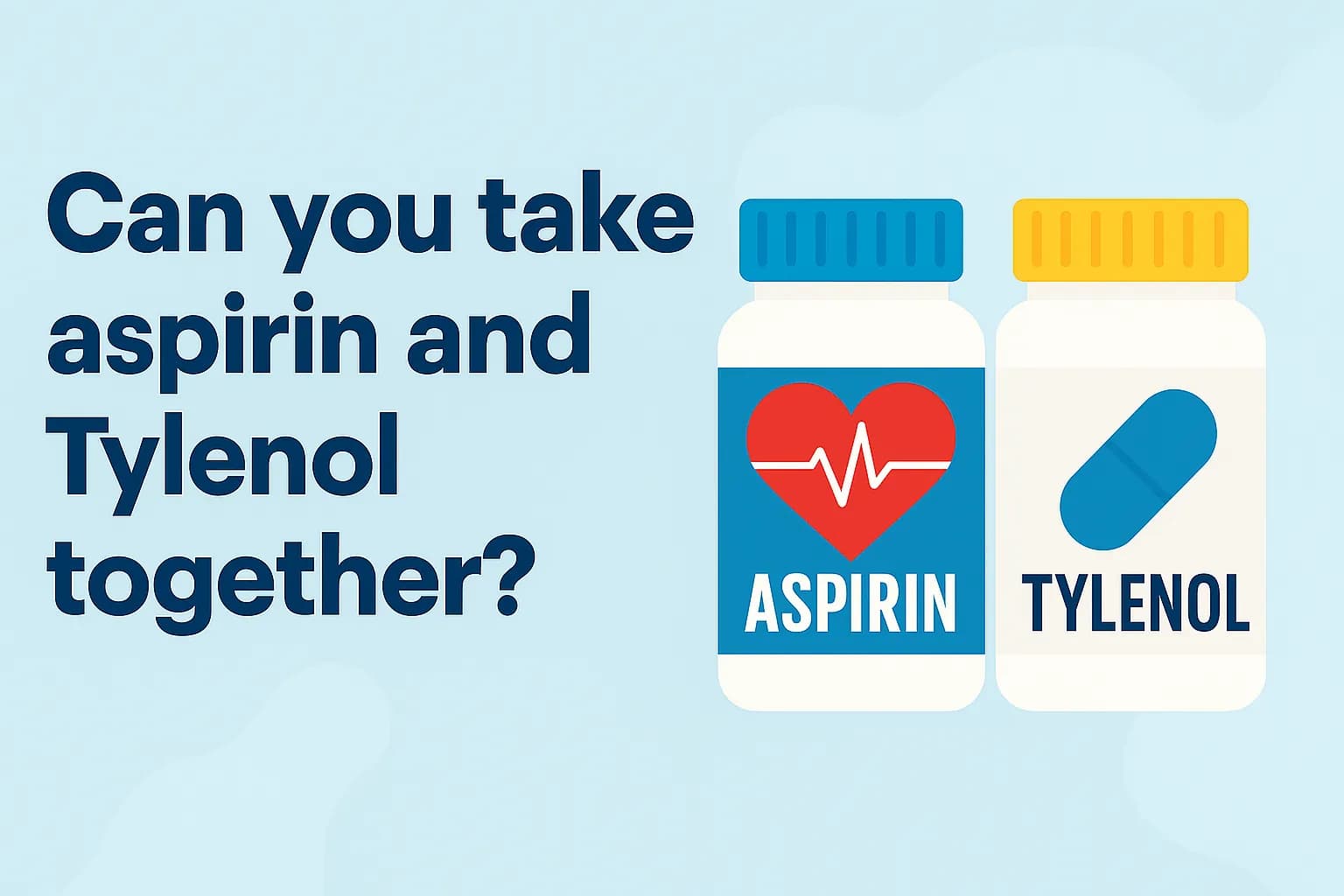What is aspirin used for?

Aspirin, also known as acetylsalicylic acid (ASA), is an over-the-counter medication in the nonsteroidal anti-inflammatory drug (NSAID) class. It is commonly used for:
- Pain relief (analgesic): treats mild to moderate pain such as headaches, menstrual cramps, toothaches, and muscle aches
- Fever reduction (antipyretic): lowers fever in conditions like the flu or other infections
- Anti-inflammatory: reduces inflammation and swelling in conditions like arthritis
- Blood thinner (antiplatelet agent): daily low-dose aspirin prevents blood clots, reducing risk of heart attack, stroke, or transient ischemic attack in people with cardiovascular disease or risk factors such as high cholesterol, high blood pressure, or diabetes
Aspirin can cause side effects such as stomach irritation, ulcers, or increased bleeding, especially with long-term or high-dose use. It should be used cautiously if you have gastrointestinal issues or an increased bleeding risk.
How does aspirin work?
Aspirin blocks cyclooxygenase (COX) enzymes, which are needed to produce prostaglandins. There are two forms:
- COX‑1: helps with blood clotting
- COX‑2: involved in inflammation
At higher doses (for example, 325 mg), aspirin inhibits both COX‑1 and COX‑2, relieving pain, inflammation, and fever. At low doses (for example, 81 mg per day), it preferentially inhibits COX‑1, preventing platelets from clumping and acting as a blood thinner.
What are the side effects of aspirin?
Side effects range from mild to severe, especially with high doses or long‑term use:
- Gastrointestinal issues: stomach pain, heartburn, nausea, vomiting
- Mild bleeding: easy bruising, increased bleeding from minor cuts
- Stomach bleeding or ulcers: black, tarry stools or coffee‑ground vomit
- Allergic reactions: hives, itching, swelling of face or throat, severe dizziness, trouble breathing
- Increased risk of serious bleeding: prolonged bleeding, hemorrhagic stroke
- Reye’s syndrome in children and teenagers: a rare but serious liver and brain swelling after viral illness
- Kidney problems with long‑term or high‑dose use
- Rare liver damage in predisposed individuals
- Tinnitus or hearing loss at higher doses
What drug interactions are there with aspirin?
Aspirin may interact with:
Shop Medications
- Other NSAIDs (diclofenac, ibuprofen, naproxen)
- Selective serotonin reuptake inhibitors (SSRIs) and other antidepressants
- Anticoagulants or blood thinners (warfarin, clopidogrel, heparin, apixaban)
- High blood pressure medications (ACE inhibitors, diuretics)
- Herbal supplements (feverfew, garlic, ginger, ginkgo biloba)
- Diabetes and glaucoma medications (acetazolamide, methazolamide)
- Steroid medications (prednisone)
- Methotrexate, cidofovir
- Alcohol
- Alendronate, bismuth subsalicylate, flavocoxid, pemetrexed, sulfinpyrazone, varicella live vaccine
What warnings or precautions are there with aspirin?
Before taking aspirin, tell your healthcare provider if you have or have had:
- An allergy to aspirin or similar medications
- Stomach ulcer or gastrointestinal bleeding
- High blood pressure
- Indigestion or upset stomach
- Asthma or lung disease
- Bleeding disorders (hemophilia, low platelet count)
- Liver or kidney disease
- Gout
- Heavy menstrual bleeding
- Pregnancy, planning pregnancy, or breastfeeding
How can aspirin prevent a heart attack?
Aspirin prevents blood clots by stopping platelets from binding together. Plaque ruptures in arteries can trigger clot formation, blocking blood flow to the heart or brain. Low‑dose aspirin reduces clotting ability and helps prevent heart attacks and strokes, though it also increases bleeding risk.
Recommended dosages
- Heart protection: 75 mg to 100 mg daily, taken at the same time each day with food and water; during a heart attack, 160 mg to 325 mg may be given
- Pain or fever: 325 mg to 650 mg every 4 hours as needed, not more than 12 tablets (3,900 mg) in 24 hours; limit to 3 days for fever or 10 days for pain unless directed otherwise
Related Medications
- Tylenol (acetaminophen)
- Bayer Enteric-Coated Aspirin (acetylsalicylic acid)
- Plavix (clopidogrel)
- Coumadin (warfarin)
- Xarelto (rivaroxaban)
- Eliquis (apixaban)
Sources
- American Heart Association. Aspirin and heart disease. Accessed Sept. 10, 2024.
- FDA. Aspirin for reducing your risk of heart attack and stroke: Know the facts. Accessed Sept. 10, 2024.
- Arnett D, Blumenthal R, Albert M, et al. 2019 ACC/AHA Guideline on the Primary Prevention of Cardiovascular Disease. JACC. 2019;74(10):e177–e232.
- Bayer HealthCare LLC. Bayer low dose aspirin tablet [package insert]. DailyMed. 2022.
- Medscape. Aspirin (Rx, OTC). Accessed Sept. 10, 2024.





